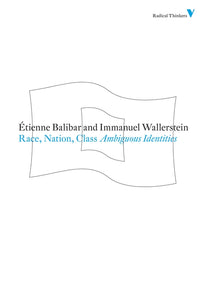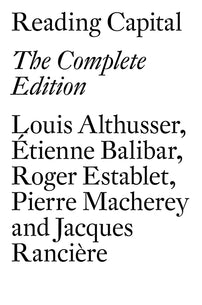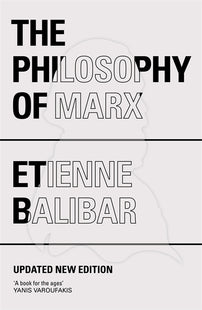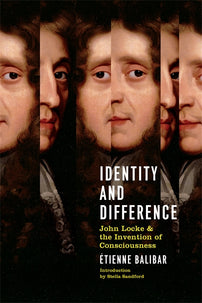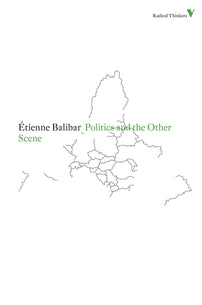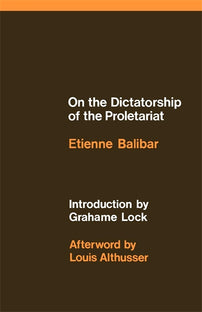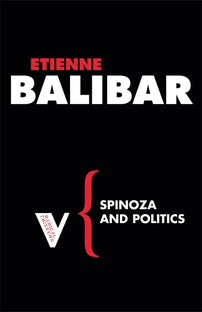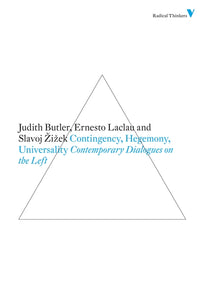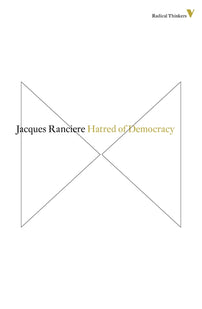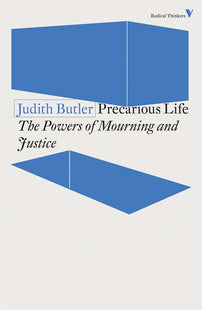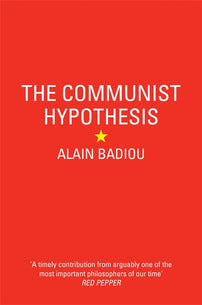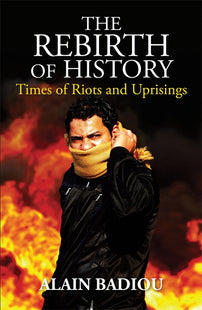Democracy, Oppression, and Universality: an Interview with Étienne Balibar
Balibar discusses nationalism, universalism, Europe, resistance, and the influence of Althusser.

First published at the Birkbeck Institute for the Humanities blog. The Birkbeck Institute for the Humanities stimulates research, public debate and collaboration among academics and intellectuals on important issues of our time. Key to its remit is the promotion of new ideas and forms of understanding in the humanities.
During your recent Masterclasses on "Towards a New Critique of Political Economy" at the BIH [available here] you have been arguing for a need to reconsider Marxian political economy. However, given the contemporary political issues, we would like to focus on your previous work on the relationship between race, class, and nationalism. We wanted to ask about the paradox that despite the increasing use of divisive politics by capitalist leaders, they still manage to get more votes from the oppressed and the deprived. For instance, we have in mind the situation in Turkey, India, US, and the UK. Despite their differences in culture and geography, they have a lot in common regarding their political situation. We were wondering how you would response to this paradox.
I wish I knew the simple answer to that question… But I agree this is a burning question that we cannot avoid. On the first question, I would ask whether there is anything new in the fact that masters, and those in power in this world, are supported by or get their voices from the dispossessed and the oppressed. And my answer would be, no, it was always like that. So, of course that is something shocking not only from the point of view of revolutionary, anti-capitalist ideology but also simply from the point of view of ethics and justice. The famous Renaissance 16th century French philosopher [Étienne de La Boétie] who died very young but left a book, which is always quoted, coined the expression “voluntary servitude." Of course the paradox of voluntary servitude is that it’s essentially involuntary; it’s not the result of something you decide. So the question is about two things, it’s about whether there is something like a quantitative chain — is there more misery, poverty, and violence in today’s world than it used to be in the past? That depends where you situate yourself. In any case there is no way of measuring that, and then the global answer is bound to be arbitrary. I always quote and keep referring to the discourse of the UN Secretary General at the time Kofi Annan, which is known as the “millennium discourse." In a short keynote, following President George Bush who explained that terrorism is the enemy of civilisation and everybody in the world had to rally the strategy to eliminate this threat, Annan shifted this discourse beautifully and said this: depending where you are, depending on which level of society, and which part of the world you live, you inevitably propose a different ranking regarding which threats are unbearable. This is not to say terrorism is not a threat — and this was before Islamic State. But this is just to say that there cannot be anything like a simple divide, if you like, between those who suffer and those who exert exploitation. So there is a tendency in these discourses, to blur entirely the enormous heterogeneity of the situation in which violence operates.
Of course that’s not enough, and then the question becomes more intrinsic: why it is that the oppressors can be seen as the liberators? You are going to ask about Trump, you are going to ask about Erdogan, you are going to ask about others. I’m not only speaking about the return of nationalism or religious intolerance and so on. I believe, with enormous concern, that we are witnessing the return of fascist forms of politics, which are not totally identical, but have much in common. When you see a leader like Trump addressing and exciting a crowd, these people in the crowd are not the most miserable or poor in a sense, but they are also not the wealthy. Exciting them against foreigners, the media, and the legal system seems to reiterate something we saw with Mussolini, Hitler, and some others. So that calls for a more disturbing kind of answer which comes closer to the issue of voluntary servitude. Traditional Marxism calls this "false consciousness" but I don’t entirely adopt this, because it suggests a class explanation that doesn’t work well when you come to fascist processes. So then, we must ask why masses of individuals prefer the imaginary enemies to the real enemies. My friend Alain Badiou has a very simple explanation. He says, because the idea of communism is not enough on the stage, fascist ideas and representations are on the rise, and socialist and communist ideas are absent. The class dimension is very important undoubtedly, but the other key issues, such as race and moral issues in relation to gender relations and sexualities. As I argue in my little book Saeculum, religion relates to one’s body, identity and sexuality. It is not by chance that all great religions organise and therefore codify and simplify in particular the sexual relations. This is not a domain in which you have enemies, so the enemies are imaginary; the transformation of morals and the world seems to threaten the traditional ways of codifying. Times of economic uncertainty and of the blurring of the borders between cultures, and civilisations are increasing the pressure on individuals to defend themselves in the capitalist market. That creates a very deep anxiety before any form of disruption to the traditional family, and racial and sexual organisation that is perceived or felt not only by the dominant but also by the dominated. That is why so many women are accepting the incredibly violent and sexist discourses that Trump and others propose. But here I am not explaining, I am describing the complexity of the field.
About 15 years ago, you wrote We, the People of Europe, and you mentioned a phrase in that book, “laboratory of democracy”, which in a way takes the European model. Considering the recent developments such as Britain’s leaving the EU and the so-called refugee crisis, how would you read that text now? What amendments would you like to make?
I hope I did not say anywhere that Europe was a model of democracy; I agree with Jacques Rancière and others that it is not a stable regime. Democracy is a tendency, a relationship of forces… it’s a fragile equilibrium that needs of course to become institutionalised, but whose institutions can never be taken for granted. This is an equilibrium between say, inequality, authority, and discrimination on one side, and equality, participation, mutual recognition of the rights and duties of the citizens on the other side. The whole legitimisation of Europe’s imperialism, or Europe’s substitute or surrogate of the American discourse of the “free world," was based on two wrong ideas. First, we Europeans invented democracy, and second, we were preserving the modern, and offering it to the whole world as something to be followed, if not to be imported and imposed. So of course this is absolutely what I reject. On the other hand, I would not identify with democratising tendencies with liberation from the European models. I find the discourse that explains the democratic structures and the rights of the citizen on pure and simple instruments to cover and legitimise the European domination of the world, as not touching the important point. That’s why I used the expressions "laboratories" and "workshops." I thought it was important not only to have general discourses on democratic principles, but also to have evaluations as to where the implementations of these principles had got in the world in general. It was important to identify places, spots, or sights where the conflictual or the alternative could be perceived, and where the cause of democracy and democratisation could be fought for. As soon as you start to try and enumerate such places, it becomes infinite. Of course, I was largely driven by my own commitments of the day. When I wrote about the border as an institution, as a laboratory or workshop of democracy, what I had in mind was the fact that the border could no longer be considered as a kind of historical, already given condition for political life; but rather that its management imposed constraints on people. This resulted in the kind of initiatives, that my friend Engin Isin would call "acts of citizenship." People might invent and democratise the borders, something apparently very bizarre but increasingly central in our world. And we are going to see that in Europe and the Mediterranean,that the border world as such has become a worksite or a laboratory of democracy, in a similar way as the factory, perhaps the family, and the school. Just like the progressive broadening of the civic and democratic dimensions of social life that occurred in the second half of the twentieth century. Rancière is a very useful reference here. He argued that wherever people struggle for equality of rights and power, while at the same time acknowledging the differences and the pluralism of cultures, you have something like a "laboratory of democracy." You might say that we are in a depressing moment in which all these laboratories are more or less closing. But I don’t think that’s true; it’s not as simple as that. What seems to be the case is the huge imbalance of power, and the level of the state and the central institutions of the traditional democratic societies. That should mean either there is a conjuncture of tension, hesitation, or uncertainty, or that maybe the problem was not posed in the right way. But I’m not tempted, contrary to perhaps some of my friends and even my grandson, who is now 19-20 years-old, when they say to me, "why do you care, why do you vote? What use is that? This is not where people can have a voice…." Then I say to them, well your question is embarrassing to me because in the coming elections I might find myself in a situation where I would not be able to decide which vote I should cast. But this being said, perhaps I don’t have enough libertarian or anarchist views. It’s the rules so to speak, which make it possible for different people to live together without their conflicts becoming civil wars. It’s true that the parliamentary systems in most of our countries have become ossified and their democratic potentialities are minimal; but the elimination of every notion of representation might be a very dangerous gamble, at least for the time being.
Again thinking about Europe, we were wondering what you mean by Europe? Referring to your latest book Des Universels, we ask this question to know whether this is a "universal" category. Also, what analytical separation do you draw between the categories "universal," "universality," and "universalism"?
These are two different questions. Europe is a pragmatic, political problem. I am so profoundly influenced in my intellectual training by the inter-European circulation of ideas, that it’s part of my identity — political and intellectual. This is to vindicate the European point of view rather than a purely nationalistic point of view. This is all the more important now because with the main tendencies of the new populism, not to say neo-fascism, nationalist tendencies are on the rise. And they do not remain purely theoretical, they also target individuals. However, at the same time, I am deeply aware that Europe is not the world, and there are fundamental issues like racism that substitute Europe for the nation. This might make the situation worse. Something I have said in the past is relevant here: the pan-European xenophobic movement is now in fact being created on the basis of something utilitarian, and with the rising passion against the refugees and Muslims, we are witnessing the emergence of a European exclusionary discourse. It is hence absolutely necessary to discuss the concrete forms in which we implement our universalism in a framework that is not purely European, but which continuously evolves and involves. That’s why to me the Mediterranean spaces are just as important as the European space. History, culture, languages etc. have produced the concept of the Mediterranean as borderless; though it is full of borders, it doesn’t have pre-existing external limits. I am ready to discuss the reasons why we should resist the disintegration of the European Union, but we should not identify the European ideal with the "universal" as such.
The other side of the question is more complicated because it is more technical, philosophically speaking. Essentially, I tried to propose, not a codification, but a kind of rule of co-existence or good use by distinguishing these three. The two extreme terms are the easiest to define — "the universal" is a logical category although there are fine nuances which have to do with whether you privilege the reference to the one or to the whole when you try to define a category or a value of a discourse as universal. It still remains relatively simple because you have the obvious opposition between universality and particularity. On the other hand, "universalism" is also not too difficult to define because first, we have important historical examples: in the West in general, but also the whole Islamic area in the form of religious monotheism or the discourse of human rights which clearly fit with the notion of universalism. So I borrowed happily from Judith Butler in her dispute with Zizek and Laclau the idea that such universalisms are always conflicting with one another. This conflict is endless because we are not already aware of all the universalisms that are likely to emerge. For example, "ecology" is already becoming a powerful universalistic discourse, which insists on changing the relationship between man and nature. This is not a new religion, but a new universalism.
The most difficult and interesting for me is "universality" — the intermediary one. Put simply, it has to do with the fact that the universal, which may become the central reference to beat the universalistic discourse needs to be enunciated, needs to be given a language by the people who live in certain places and times. As Hegel beautifully explained, there is something intrinsically paradoxical in enunciating the universal — you give it a name, you say it in a given language, you produce instantly a reversal of the idea of universality itself, which then becomes particular. But this is not a relativistic confusion but the confusion is rather the enunciation of the universal which I call "universality." It is a struggle or resistance against its own negation. Philosophically, this is one of the most interesting issues addressed by Wittgenstein, and of course Hegel, namely what kind of retroactive effects it produces on the discourse itself, so that it claims to be saying the “universal."
In the light of our conversation, is there still a hope for resistance? What would resistance mean to you now in the world we live in today?
I don’t work with a general definition of resistance. I tend to agree with Foucault, that resistances are associated forms of power. Foucault proposed systematic forms of resistance in his famous essay "Subject and Power" where he said, where there is power, there is resistance, but there’s something more than that. The interesting fact that power does not purely and simply seek and abolish resistance, but rather in many cases seeks to instrumentalise, or hire resistances to reinforce itself. It is not completely away from the question of "voluntary servitude" that the most powerful authority is the one that has managed to somehow co-opt the resistance of its own subject. This leads not to an interesting strategic understanding of the articulation of power and resistance, but to the situation where there are always specific powers and specific resistances. There is no such thing as power or resistance in general or as totalising categories; there are resistances in and from within various forms of power, so you need to say which. But then some of Foucault’s interlocutors would show him that this strategic description of the idea that the relationship of forces fluctuate, and where the stronger side can change place, find their limits in what he at the time would call "domination." He would always carefully avoid discussing the Marxist theory of exploitation, but he could have said exploitation is not an all or nothing situation but depends on the relationship of power in the market. More interesting objections were raised when he was discussing with American feminists in the Berkeley campus, who said that there are relationships of power which were never reversed, hence lasting centuries or millennia; like men and women, with the latter’s capacity of resistance being minimal. 1 He was embarrassed, and he proposed a weak argument saying: even where women were completely oppressed — he referred to traditional Muslim cultures — women gather and make fun of their men! This is to say, you always find a form of resistance. That sounds like a weak argument, then Butler would perhaps — and now I’m inventing here — jump into that where the excitable speech and the discursive dimension of every power relation is strongly emphasised, and this is the possibility of irony and performative reversal of various forms of authority. It doesn’t abolish power, but there is no such thing as an unquestionable form of power. It is the same for capitalism. Colonial racism is an interesting example — even after slavery was abolished, it clearly has lasted its capacity and hierarchised humans, but the colonial power itself has been abolished when it once seemed to be indestructible.
You often refer to Althusser as your “intellectual master." We are curious to know your experience in your formative years as his student?
The Althusser you may have contacted today is enormously different to the one I knew. Simply because of the time that has passed. I knew him for a relatively brief period. Interestingly, Althusser has written many unpublished works, most of them unfinished, but then, what is a finished work? In the new generation there is an increasing number of young scholars who discover this aspect of philosophy that never reached a point of completion. So it is either aleatory materialism, ideological state apparatuses (ISA), questions of reproduction, symptomatic reading. Althusser created a very large number of instruments/categories that can be disentangled from the time when he wrote those things and be reutilised and activated in current times — this I have to say creates some surprise in me. But the surprise is overcome when I discover that there it is not a question of repetition. Althusser is known to have invented ISA; Judith Butler refers to that, and Marxists too. This whole schematism of the interpellation of subjects by an invisible source of legitimacy provides powerful instruments for critical analysis. A young colleague of mine called Maria Kakogianni, sometime ago coined a term, "market ideological apparatuses." I found that marvellously intelligent because neo-liberalism interpellates subjects in a very sophisticated way, as permanent competitors or as subjects of commoditized needs. This Althusser does not address. But then I have had a privilege that was not diminished with time, of being taught by someone who had a remarkably egalitarian way of teaching. In our class he said, “I don’t know how to read Capital but we need to figure this out together urgently because currently we need to rescue the Communist Party from its demise." That was true for the categories I was mentioning earlier. I have an internal perception of the momentum of the constitutive uncertainty of these categories. I keep thinking that I must do something with them.
I have an enormous respect for Althusser but he was not my only master, and as you’d know he was also a heavy pathological case, oscillating between melancholia and manic moments. Some of my friends — I am not giving any names — were caught in Althusser’s madness and paid a heavy price for that. I don’t know if I have myself been caught in that madness. But I also had other masters, though I didn’t work with them in the same manner but I admired them as much. So when I am asked to give a list, I name these: the French translator of Hegel, Jean Hippolyte; Georges Canguilhem who supervised my master’s thesis; and of course Jacques Derrida, who has been just as influential on me as Althusser.
Lastly, what makes you come back to Birkbeck Institute of Humanities?
Because it originates the programme of “adult education," Birkbeck has a special place within other colleges of University of London. I believe that personalities like Eric Hobsbawm opened a certain way of social and critical thinking, and you need to be careful not to transform that into a pure myth. Traditions do exist and they are worth being preserved. Especially now, when not only academic institutions but also humanities in general, the freedom of research is in danger. Institutions like Birkbeck, as you asked earlier, are a form of resistance, especially if there is invention of new forms. And this can happen through collaboration between professors and students in an egalitarian way.
Notes
1. Michel Foucault gave series of lectures at UC Berkeley themed “The Culture of the Self” in the last years of his life circa 1983.
[book-strip index="1" style="display"]